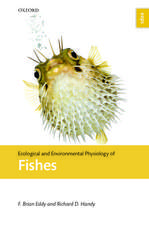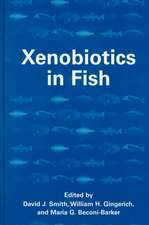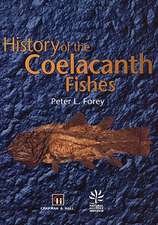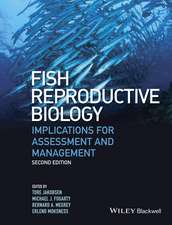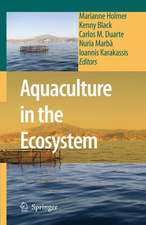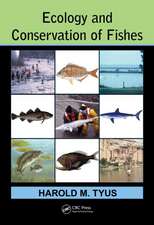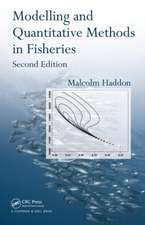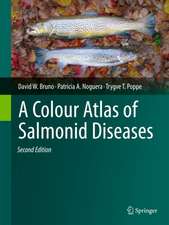Extremophile Fishes: Ecology, Evolution, and Physiology of Teleosts in Extreme Environments
Editat de Rüdiger Riesch, Michael Tobler, Martin Plathen Limba Engleză Hardback – 5 feb 2015
| Toate formatele și edițiile | Preț | Express |
|---|---|---|
| Paperback (1) | 1163.74 lei 6-8 săpt. | |
| Springer International Publishing – 5 oct 2016 | 1163.74 lei 6-8 săpt. | |
| Hardback (1) | 1204.61 lei 6-8 săpt. | |
| Springer International Publishing – 5 feb 2015 | 1204.61 lei 6-8 săpt. |
Preț: 1204.61 lei
Preț vechi: 1469.03 lei
-18% Nou
Puncte Express: 1807
Preț estimativ în valută:
230.52€ • 239.31$ • 192.22£
230.52€ • 239.31$ • 192.22£
Carte tipărită la comandă
Livrare economică 22 martie-05 aprilie
Preluare comenzi: 021 569.72.76
Specificații
ISBN-13: 9783319133614
ISBN-10: 3319133616
Pagini: 326
Ilustrații: XII, 326 p. 30 illus., 16 illus. in color.
Dimensiuni: 155 x 235 x 25 mm
Greutate: 6.33 kg
Ediția:2015
Editura: Springer International Publishing
Colecția Springer
Locul publicării:Cham, Switzerland
ISBN-10: 3319133616
Pagini: 326
Ilustrații: XII, 326 p. 30 illus., 16 illus. in color.
Dimensiuni: 155 x 235 x 25 mm
Greutate: 6.33 kg
Ediția:2015
Editura: Springer International Publishing
Colecția Springer
Locul publicării:Cham, Switzerland
Public țintă
ResearchCuprins
Extremophile fishes: An Introduction.- Low-Oxygen Lifestyles.- The Adaptive Radiation of Notothenioid Fishes in the Waters of Antarctica.- Desert Environments.- Hypersaline Environments.- Life in the Fast Lane: A Review of Rheophily in Freshwater Fishes.- Hydrogen Sulfide-Toxic Habitats.- Cave Environments.- Pickled Fish Anyone?.- Temporary Environments.- Evolutionary Toxicology: Population Adaptation in Response to Anthropogenic Pollution.- Extremophile fishes: an integrative synthesis.
Recenzii
“The volume has been carefully edited so that each of the 10 chapters that cover a type of extremophilia touches on a similar set of points. … The strengths of this book include its emphasis on integrative combinations of disciplines in each chapter, the breadth of interesting case studies, and the diverse expertise of the authors. … I recommend it to anyone building a library on research in fishes.” (Eric T. Schultz, The Quarterly Review of Biology, Vol. 90 (4), December, 2015)
Textul de pe ultima copertă
This book summarizes the key adaptations enabling extremophile fishes to survive under harsh environmental conditions. It reviews the most recent research on acidic, Antarctic, cave, desert, hypersaline, hypoxic, temporary, and fast-flowing habitats, as well as naturally and anthropogenically toxic waters, while pointing out generalities that are evident across different study systems. Knowledge of the different adaptations that allow fish to cope with stressful environmental conditions furthers our understanding of basic physiological, ecological, and evolutionary principles. In several cases, evidence is provided for how the adaptation to extreme environments promotes the emergence of new species. Furthermore, a link is made to conservation biology, and how human activities have exacerbated existing extreme environments and created new ones. The book concludes with a discussion of major open questions in our understanding of the ecology and evolution of life in extreme environments.
Caracteristici
This book sheds new light on the biology of extremophile fishes and the different kinds of extreme environments they inhabit
It covers some of the best-studied cases of extremophile fishes and provides an overview over the key adaptations enabling them to survive under extreme conditions
Readers will discover novel perspectives on the origin and evolution of life and particular attention is given to predicting ecosystem-wide responses to pollution and climate change
Includes supplementary material: sn.pub/extras
It covers some of the best-studied cases of extremophile fishes and provides an overview over the key adaptations enabling them to survive under extreme conditions
Readers will discover novel perspectives on the origin and evolution of life and particular attention is given to predicting ecosystem-wide responses to pollution and climate change
Includes supplementary material: sn.pub/extras

